The sound of a quartet tuning. An alchemical procedure of attunement before a performance.
The respite of an extended silence imbued with utter darkness.
Then, the melancholic sound of a violin that transmutes into a disconsolate musical interlude, before a woman’s face in the background is rendered visible by light and projected—large-scale black-and-white—onto a translucent scrim in the foreground. Krystyna Janda, deliberate and measured, begins:
“Our parents, the older generation of our emigration, were very diverse. Among them were Jewish Jews, living a Jewish life. There were Polish Jews—they believed that it was possible to be a Jew and a Pole concomitantly and without conflict. There were also the post-war Polish marranos, who hid their Jewish ancestry, be it out of necessity, or because that was easiest.”
Thus opens Zapiski z wygnania [Notes from Exile] directed by Magda Umer, which premiered on 9 March 2018 at Teatr Polonia in Warsaw, and which I witnessed on 16 December 2018 on the Main Stage of the National Stary Theatre in Kraków as part of the 11th annual Divine Comedy Theatre Festival. The performance is based on Sabina Baral’s 2015 memoir published in Polish under the same title, which recounts her experience of forced migration impelled by the anti-Jewish campaign and purges instigated by the Minister of the Interior of the Polish People’s Republic, General Mieczysław Moczar.
The anti-Semitic campaign was fomented by several factors and constituted a part of a larger political crisis that culminated in March of 1968. It began in 1967 following the Arab-Israeli war, when the executive committee of the Polish communist party—taking lead from the Soviet Union—condemned Israeli aggression, eventually breaking all diplomatic relations with Israel, and pledged continued support of the Arab States. Subsequently, the administration incited “anti-Zionist” political propaganda and began removing Polish Jews from positions of power. This state-sponsored campaign was an opportunistic tactic to undermine the appeal of the liberal wing of the party and to conveniently shift attention away from the economic crisis, the growing anti-government sentiment, and the ongoing protests by scapegoating Jews. The early months of 1968 also saw widespread unrest and student protests triggered by the closure of Kazimierz Dejmek’s staging of Adam Mickiewicz’s eighteenth-century play Forefathers’ Eve, which the authorities banned after just fourteen performances citing the production’s “anti-Russian” and “anti-socialist” references as the reason. While the activists condemned the government’s infringements upon free speech and blamed Moczar and his entourage for the anti-Semitic incidents, the participation in the protests of leading dissidents that happened to be Jewish—such as Adam Michnik and Henryk Szlajfer—further consolidated the administration’s anti-Jewish smear campaign. According to historian David Engel, the Interior Ministry created a card index of all Polish Jews, regardless of their political alliances or religious dispositions, and coerced some 25,000 Jews to leave Poland between 1968 and 1970 through a systematic mobilization that included being expelled from school, fired, harassed, and—in some cases—brutalized.
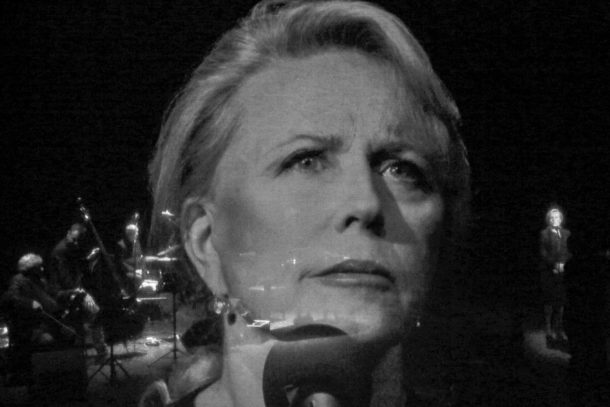
Notes From Exile by Sabina Baral, directed by Magda Umer at the Teatr Polonia Warsaw. Photo: Katarzyna Kural-Sadowska.
Sabina Baral was twenty years old in 1968 when her family was compelled to leave her hometown of Wrocław, Poland within the span of three weeks. Her beautifully rendered memoir is brought to life on the stage by Janda and Umer on the fiftieth anniversary of the March events. This work of documentary theatre splices Baral’s text with spoken and sung poetry, as well as archival photographs and films. Janda transposes Baral’s voice pointedly in her solo performance accompanied by music director Janusz Bogacki and his ensemble composed of Tomasz Bogacki (guitar), Mateusz Dobosz / Paweł Pańta (double bass), Bogdan Kulik (percussion), and Marek Zebura (violin). Her style of recitation is subdued, suffused with silences, only occasionally giving way to a subtle smile or wiping away a seldom tear with an upward stroke of the hand. This restraint—with inverse precision—gives space to the emotional and affective force of this specific confluence of history and memory. The mise en scène is not unlike the conventional setting of a sung poetry performance: a sparse stage populated only by microphones and instruments. Janda stands center stage left, behind a microphone stand—the musical ensemble to her right. The variance here is the scrim that enfolds the performers and serves as a surface for Radosław Grabski’s projections. These consist of close-ups of Janda—which give the audience a view of the actor’s nuanced facial expressions—and archival material that serves as a portal to both an earlier time and contemporary Polish street scenes.
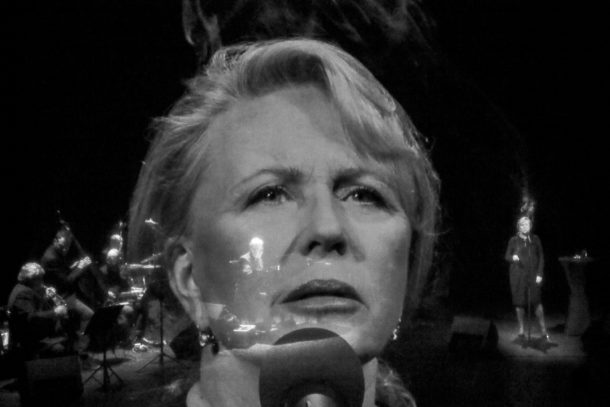
Notes From Exile by Sabina Baral, directed by Magda Umer at the Teatr Polonia Warsaw. Photo: Katarzyna Kural-Sadowska.
Sung poetry is a popular Polish performance style that predates the second world war. It is closely related to the likewise prominent genre of theatrical song (piosenka aktorska, literally “the actor’s song”). Both categories of performance pivot around the interpretation of a poetic text—not originally intended to be sung—that is now set to an original musical composition and serves as the vehicle for the expressive encounter between the performer and the public. The latter is especially concerned with mining the rich palette of the artistic and expressive means of the actor, and placing them in the service of the interpretation of the text in performance. Janda and Umer are no strangers to these genres. Janda made her vocal debut in 1977 at the 15th National Festival of Polish Song in Opole at the urging of one of the most renown Polish popular music artists of the time: Marek Grechuta. Subsequently, she continued to work in cabarets and went on to collaborate with Grechuta on several music projects. Umer—a singer, journalist, author, screenwriter, film director, and actor—is probably best known for her performance of sung poetry, a genre she embraced as a university student in the early 1970s when her senior colleagues invited her to join the cabaret group they were forming. Drawing on almost five decades of experience as a performer in the genre, Umer deftly weaves sung poetry into the performance. These pieces include—among others—“Pocałunki” [Kisses] by Maria Pawlikowska-Jasnorzewska (one of Baral’s favorite poets); “Jeszcze” [Still] by Nobel Laureate Wisława Szymborska; and Zygmunt Białostocki’s “Rebeka,” a tango infused with Chasidic motifs, whose celebrated rendition by Ewa Demarczyk is well-known to Polish audiences.
Photographs on surfaces. Images of Polish Jews who emigrated from Poland in 1968, parting scenes, train station departures, a set of hands grasping the exterior of a Polish State Railways passenger car window, hands emerging from the inside. Janda transitions into “My, Żydzi polscy…” [We, Polish Jews…]:
“I am a Pole because I like it that way. This is my completely private affair which I have no intention of explaining, clarifying, demonstrating or justifying to anyone. I do not divide Poles into “pure” or “not pure,” but leave that to the pure racists, to native and not native Hitlerites. I divide Poles, just as I do Jews and other peoples, into wise and stupid, polite and nasty, intelligent and dull, interesting and boring, injured and injuring, gentlemen and non-gentlemen, and so forth. […] If, however, it actually comes down to the justification of my nationality or, rather, my national identity, then I am a Pole for the simplest, almost primitive reasons—mainly rational, partly irrational, but without any “mystic” coloring. To be a Pole… that is neither an honor, nor a glory, nor a privilege. The same is true of breathing. I have not yet met a man who is proud that he breathes.
[…]
A Pole—because that is what I was called in Polish in my parents’ home; because from infancy I was nourished there on the Polish language; because my mother taught me Polish poetry and songs […].
A Pole—because it was in Polish that I confessed the turmoil of first love and in Polish that I stammered about its happiness and storms.
[…]
But above all else… a Pole because I like it that way. […]”
This manifesto, or—as Madeline G. Levine puts it—essay-lamentation was written by the Polish-Jewish poet Julian Tuwim in 1944 while living in exile in the United States, and published in the Autumn 1972 issue of The Polish Review (82-89). It strikes at the very heart of the question of identity so integral to this performance. Notes from Exile interrogates various dimensions of identity and processes of identity formation, and asks who makes these determinations and toward what end. Issues of identity often appear in conjunction with various operations of the state and its autocratic exertion of authority over the individual, such as the control and interpellation of identity through documents and documentation: some Jewish families were prohibited from taking any personal documents—such as birth certificates, school transcripts, and diplomas—with them when leaving Poland; all emigrants were issued one-way travel documents in which they were stripped of their Polish citizenship; Baral’s personal diary was deemed a “state document” and consequently barred from being removed from the country. Later in the piece, Janda will articulate Baral’s conclusion: “A lesson, which I practice to this day: identity is a matter of choice. Who I am and where I belong depends on one’s point of view. Only people and systems that practice ignorance or hatred make determinations about the identity of others and judge them based on that identity.”
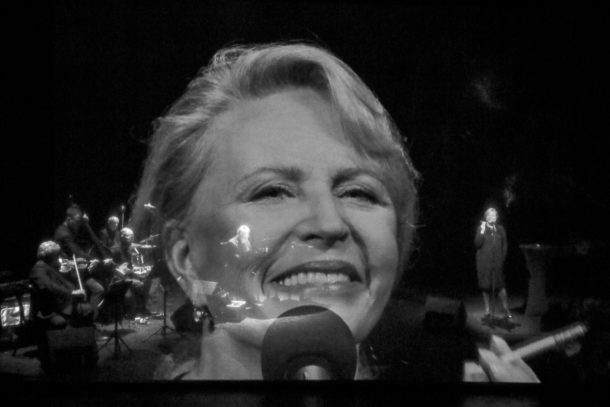
Notes From Exile by Sabina Baral, directed by Magda Umer at the Teatr Polonia Warsaw. Photo: Katarzyna Kural-Sadowska.
Janda lights a cigarette. She inhales, smiles slyly, and—smoking—sings a fragment of Herman Yablokoff’s 1920s Yiddish song “Papirosn” [Cigarettes] in Polish. Blended almost seamlessly into the song’s dénouement is archival footage of the then First Secretary of the Communist party Władysław Gomułka’s declaration made in the Warsaw Congress Hall on 19 March 1968: “To those that consider Israel their fatherland, we are ready to issue emigration passports.” Umer’s dramaturgical collage pleats moving and still images, sounds, and sensory life-worlds into a compositional assemblage that bears semblance to a true Piscatorian documentary theatre, which excavates the political truths lying dormant in the archive. Janda conveys a situated listener to Gomułka’s speech by again voicing Baral’s memoir, which provides a perspectival framing of this historical moment. Baral remembers listening to this famous meeting of the active party membership with her university colleagues, when her professor turned on the radio instead of giving a lecture that day. Baral’s narrative extends the context of this speech by appending the then Prime Minister Józef Cyrankiewicz’s assertion: “For simultaneous loyalty toward socialist Poland and imperialist Israel is not possible.”
Janda’s masterful performance is both anticipated by and invigorates her distinguished reputation and stature as an actor. Janda is not only an iconic figure within theatre and cinema, she also embodies the socio-political force of the Polish underground that led to the revolution of 1989 and the subsequent demise of the Communist regime. These two aspects are indissoluble as they conjoin in her role as the young filmmaker, Agnieszka, in Andrzej Wajda’s Człowiek z marmuru [Man of Marble] (1976) and its sequel Człowiek z żelaza [Man of Iron] (1981), as well as Antonia “Tonia” Dziwisz in Ryszard Bugajski’s Przesłuchanie [Interrogation] (1982). These distinctly political films contained strong anti-communist overtones and circulated covertly after being banned by the administration.
Man of Iron won the Palme d’Or in 1981, the same year it was illegalized by the Polish government. Interrogation was suppressed for seven years. It was finally released in December of 1989, and earned Janda the Cannes Best Actress Award the following year—among many others. As the main protagonist of these perforce clandestine films, Janda figured as the personification of political dissidence of the 1970s and 1980s.
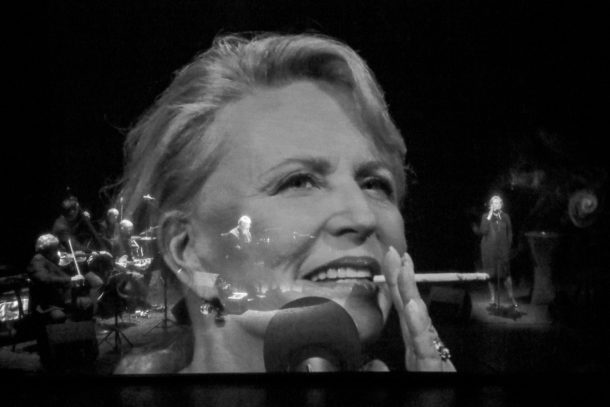
Notes From Exile by Sabina Baral, directed by Magda Umer at the Teatr Polonia Warsaw. Photo: Katarzyna Kural-Sadowska.
“History repeats itself.” This oft-recurring line of the performance, is also true of Janda’s role as an artist and political instigator. Janda’s performance in Notes from Exile actualizes “the forgotten” and—to paraphrase Diana Taylor—reactivates past scenarios by staging them in the present. This mechanism not only resists the erasure of certain—minoritarian—strands of the historical past, it serves as a vehicle for the political mobilization of memory and makes history available as a resource in the present. The rise of the national-conservative party and the upsurge of the far-right in Poland, make the political urgency of this production particularly salient. Umer’s strategy to include a coda indexing contemporary street scenes of marches of the National Radical Camp (ONR)—an ultranationalist organization with neo-fascist, anti-Semitic, and Islamophobic ideologies and agendas—acts as a portal to the present, the stark actuality of the world outside the theatre’s darkened auditorium. The maneuver forces the spectator to confront the harsh reality of the present, which is thrown into sharp relief against the past. This juxtapositional operation all but collapses the present and the past. The efficacy of screening documentary footage of ONR rallies, some of which took place on the anniversary of anti-Jewish riots, is further activated—and made poignant—by the still present reverberations of Janda’s final tour-de-force delivery of another fragment of Tuwim’s “We, Polish Jews”:
“We—the truth of the graves; and we—the illusion of existence.
We—the millions of corpses and the several dozens, perhaps several scores of thousands of seeming non-corpses. We—an endlessly huge fraternal grave; we—a Jewish cemetery such as history never has seen and never again will see.
We—asphyxiated in gas chambers and melted into soap which will never wash off the traces of our blood or the stain of the world’s sins against us.
We—whose brains spattered against the walls of our miserable dwellings and against the walls at which we were shot en masse… only because we were Jews.
[…]
We are a shriek of pain! A shriek so prolonged that the most distant ages will hear it. We are a Lament, we are a Howl, we are a Chorus chanting the funeral El mole rachmim, the echo of which will resound from century to century.
We, the most magnificent heap of bloody manure in history, with which we have fertilized Poland so that the bread of freedom will taste better for those who survive us.”
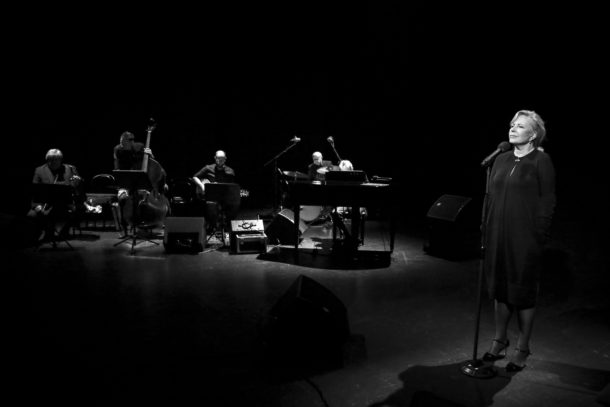
Notes From Exile by Sabina Baral, directed by Magda Umer at the Teatr Polonia Warsaw. Photo: Katarzyna Kural-Sadowska.
Dominika Laster is Assistant Professor and Head of Theatre at the University of New Mexico. She is the Books Section Editor of TDR: The Drama Review and Co-Editor of European Stages.
Laster is the author of Grotowski’s Bridge Made of Memory: Embodied Memory, Witnessing and Transmission in the Grotowski Work (2016). She is the editor of Loose Screws: Nine New Plays from Poland (2015). Laster has also published articles in Performance Research, Slavic and Eastern European Performance, New Theatre Quarterly, and TDR. She is the curator of Decolonial Gestures: A Symposium on Indigenous Performance (2017) and Executive Co-Director of Performance in the Peripheries.

European Stages, vol. 13, no. 1 (Spring 2019)
Editorial Board:
Marvin Carlson, Senior Editor, Founder
Krystyna Illakowicz, Co-Editor
Dominika Laster, Co-Editor
Kalina Stefanova, Co-Editor
Editorial Staff:
Joanna Gurin, Managing Editor
Maria Litvan, Assistant Managing Editor
Advisory Board:
Joshua Abrams
Christopher Balme
Maria Delgado
Allen Kuharsky
Bryce Lease
Jennifer Parker-Starbuck
Magda Romańska
Laurence Senelick
Daniele Vianello
Phyllis Zatlin
Table of Contents:
- Introductory Note by Kalina Stefanova.
- “Andrzej Tadeusz Wirth (1927 – 2019) – White on White” by Krystyna Illakowicz.
- Lithuanian Marriage in Warsaw or The Last Production of the Great Eimuntas Nekrošius by Artur Duda.
- “My, Żydzi polscy [We, Polish Jews]”: A Review of Notes from Exile by Dominika Laster.
- A Report on the State of Our Society, According to Jiří Havelk in The Fellowship of Owners at VOSTO5, Prague, and Elites, at the Slovak National Theater, Bratislava by Jitka Šotkovská.
- About Life as Something We Borrow. On the Stages of Pilsen (In the 26 th edition of the International Theatre Festival There) by Kalina Stefanova.
- Redesigning Multiculturalism or Japanese Encounters in Sibiu, Romani, The Scarlet Princess, written and directed by Silviu Purcărete, inspired by Tsuruya Namboku IV’s Sakura Hime Azuma Bunshô by Ion M. Tomuș.
- About Globalization: A “Venice Merchant” on Wall Street, at the Hungarian Theatre of Cluj in Romania by Maria Zărnescu.
- The Patriots, Mary Stuart and Ivanov and the Rise of the Drama Ensemble of the National Theatre in Belgrade by Ksenija Radulović.
- The Unseen Theatre Company or How to See Beyond the Visible: The Shadow of My Soul and the Theatre of Velimir Velev by Gergana Traykova.
- Multilingual Pirandello, Understandable to Everyone: The Mountain Giants at the Croatian National Theatre “Ivan pl. Zajc”, Rijeka by Kim Cuculić.
- The return of the repressed: the ghosts of the past haunt Barcelona’s stages by Maria M. Delgado.
- A poetics of memory on the Madrid stage (2018) by Maria M. Delgado.
- The Danish National Theatre System and the Danish National School of Performing Arts: December in Copenhagen 2018 by Steve Earnest.
- Towards a Theatre of Monodrama in Turkey 1 by Eylem Ejder.
- Where Is Truth? Justiz by Friedrich Dürrenmatt, adapted and directed by Frank Castorf at the Schauspielhaus Zürich by Katrin Hilbe.
- Report from Vienna by Marvin Carlson.
www.EuropeanStages.org
europeanstages@gc.cuny.edu
Martin E. Segal Theatre Center:
Frank Hentschker, Executive Director
Marvin Carlson, Director of Publications
©2019 by Martin E. Segal Theatre Center
The Graduate Center CUNY Graduate Center
365 Fifth Avenue
New York NY 10016
European Stages is a publication of the Martin E. Segal Theatre Center ©2019
Martin E. Segal Theatre Center:
Frank Hentschker, Executive Director
Marvin Carlson, Director of Publications
©2019 by Martin E. Segal Theatre Center
The Graduate Center CUNY Graduate Center
365 Fifth Avenue
New York NY 10016
European Stages is a publication of the Martin E. Segal Theatre Center ©2019



